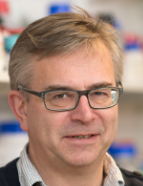Mike Murphy FMedSci
Professor of Mitochondrial Redox Biology
MRC Investigator
Wellcome Trust Investigator
Mitochondrial ROS production: Central to many pathologies and signalling processes and a key target for novel therapies
Reactive oxygen species (ROS) produced by mitochondria cause oxidative damage that impairs the ability of mitochondria to make ATP and to carry out their metabolic functions. They may participate also in cellular redox signalling pathways. One important aspect of our work is to investigate how oxidative damage to mitochondria contributes to human pathologies. We have worked out a way of targeting small bioactive molecules, such as antioxidants, to mitochondria in order to counter the effects of ROS and to examine the effects of doing so at cellular and whole animal levels. The bioactive molecule is attached chemically to a lipophilic cation such triphenylphosphonium. These cations accumulate selectively, first in the cytosol, driven by the plasma membrane potential, and then several-hundred fold in the matrix of mitochondria, driven by the membrane potential across the inner membrane. A second important aspect is to determine whether and how mitochondrial ROS alters the activities of proteins in putative signalling and protective pathways by reversibly modifying the redox state of critical protein thiols in mitochondria. We use a range of free radical and proteomic approaches to identify the proteins involved, and to identify the cysteine residues and any redox modifications. Finally, we take this information and use it to rationally design potential therapies for diseases that arise from mitochondria dysfunction. Currently our main focus for therapy is the ischaemia/reperfusion injury that arises from stroke and heart attack.
Biography
Mike Murphy studied chemistry at Trinity College, Dublin (1980-4) and obtained a PhD in Biochemistry from Peterhouse, University of Cambridge (1984-7), carrying out research in the group of Martin Brand on mechanisms of mitochondrial proton pumping. Mike then carried out postdoctoral work at Columbia University (1988), followed by working as a VSO teacher in Zimbabawe (1989) and as a Lecturer in Biochemistry at Trinity College, Dublin (1990-2). He then moved to the Biochemistry Department at the University of Otago, New Zealand (1992-2001), to set up his own research group, moving up to the level of Associate Professor. During this time he spent sabbatical visits in the lab of Jeff Schatz in Basel and that of Victor Darley-Usmar in Birmingham, Alabama. Mike joined the MRC MBU to establish an independent research group to study mitochondrial dysfunction in 2001. He was appointed an Honorary Fellow of the Royal Society of New Zealand (Hon FRSNZ) in 2012 and was awarded the Keilin Memorial Lecture and Medal in 2016. Mike has been a Wellcome Trust Investigator since 2016. He was appointed Professor of Mitochondrial Redox Biology (Cambridge University) in 2018. Mike was elected Fellow of the Academy of Medical Sciences (FMedSci) in 2019.
Publications
Selected Publications
Yin, Z, Burger, N, Kula-Alwar, D, Aksentijević, D, Bridges, HR, Prag, HA, Grba, DN, Viscomi, C, James, AM, Mottahedin, A, Krieg, T, Murphy, MP & Hirst, J (2021)
Structural basis for a complex I mutation that blocks pathological ROS production.
Nat Commun 12, 707.
Martin, JL, Costa, ASH, Gruszczyk, AV, Beach, TE, Allen, FM, Prag, HA, Hinchy, EC, Mahbubani, K, Hamed, M, Tronci, L, Nikitopoulou, E, James, AM, Krieg, T, Robinson, AJ, Huang, MM, Caldwell, ST, Logan, A, Pala, L, Hartley, RC, Frezza, C, Saeb-Parsy, K & Murphy, MP (2019)
Succinate accumulation drives ischaemia-reperfusion injury during organ transplantation.
Nature Metab 1, 996-974
Mills EL, Ryan DG, Prag HA, Dikovskaya D, Menon D, Zaslona Z, Jedrychowski MP, Costa ASH, Higgins M, Hams E, Szpyt J, Runtsch MC, King MS, McGouran JF, Fischer R, Kessler BM, McGettrick AF, Hughes MM, Carroll RG, Booty LM, Knatko EV, Meakin PJ, Ashford MLJ, Modis LK, Brunori G, Sévin DC, Fallon PG, Caldwell ST, Kunji ERS, Chouchani ET, Frezza C, Dinkova-Kostova AT, Hartley RC, Murphy MP & O'Neill LA (2018)
Itaconate is an anti-inflammatory metabolite that activates Nrf2 via alkylation of KEAP1.
Nature 556, 113-117
Booty, LM, Gawel, JM, Cvetko, F, Caldwell, ST, Hall, AR, Mulvey, JF, James, AM, Hinchy, EC, Prime, TA, Arndt, S, Benincá, C, Bright, TP, Clatworthy, MR, Ferdinand, JR, Prag, HA, Logan, A, Prudent, J, Krieg, T, Hartley, RC & Murphy, MP (2019)
Selective disruption of mitochondrial thiol redox state in cells and in vivo.
Cell Chem Biol 26, 449-461.e8
Shchepinova MM, Cairns AG, Prime TA, Logan A, James AM, Hall AR, Vidoni S, Arndt S, Caldwell ST, Prag HA, Pell VR, Krieg T, Mulvey JF, Yadav P, Cobley JN, Bright TP, Senn HM, Anderson RF, Murphy MP & Hartley RC (2017)
MitoNeoD: a mitochondria-targeted superoxide probe.
Cell Chem Biol 24,1285-1298
James, AM, Smith, AC, Smith, CL, Robinson, AJ & Murphy, MP (2018)
Proximal cysteines that enhance Lysine N-acetylation of cytosolic proteins in mice are less conserved in longer-living species.
Cell Rep 24, 1445-1455


